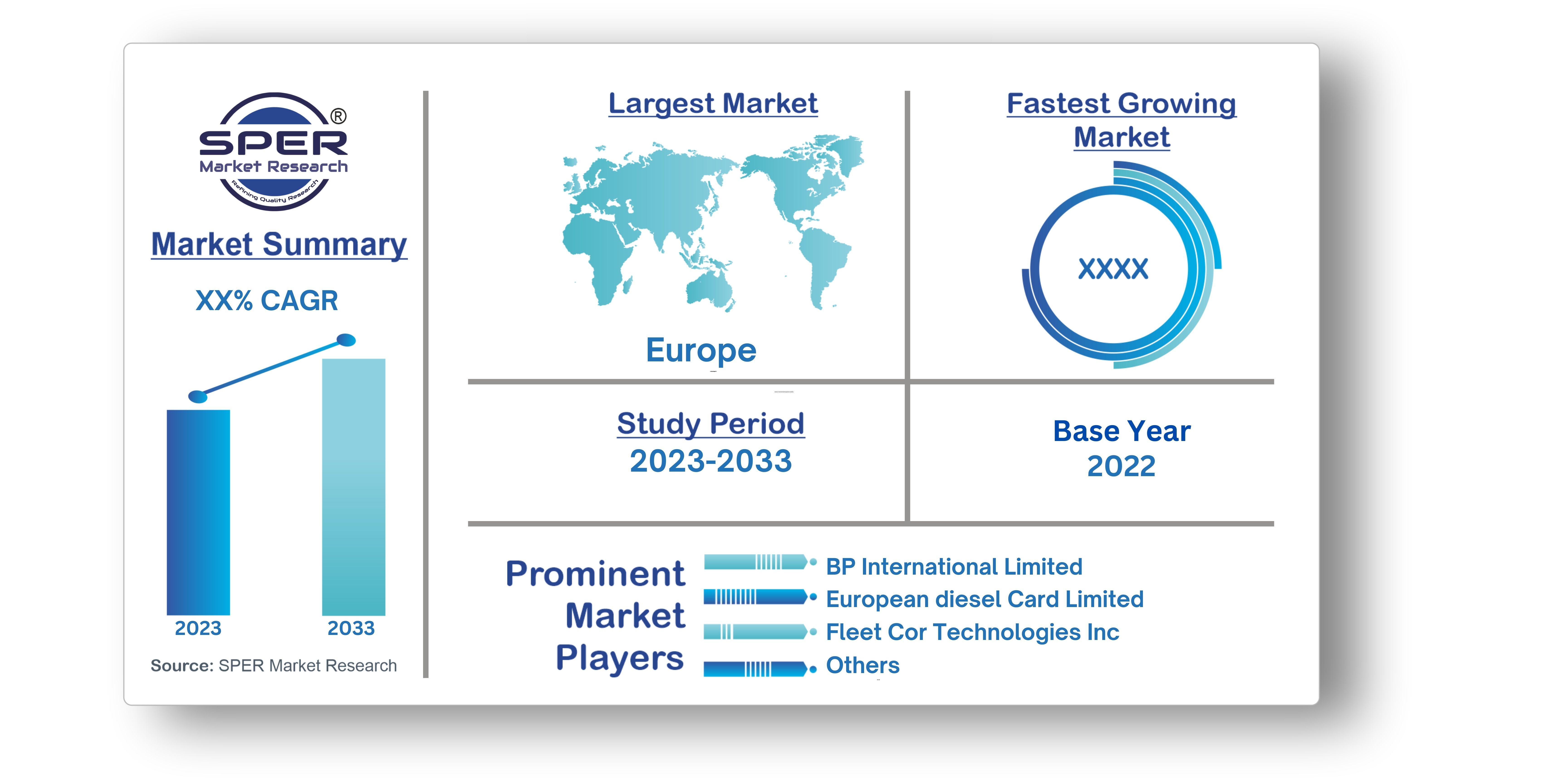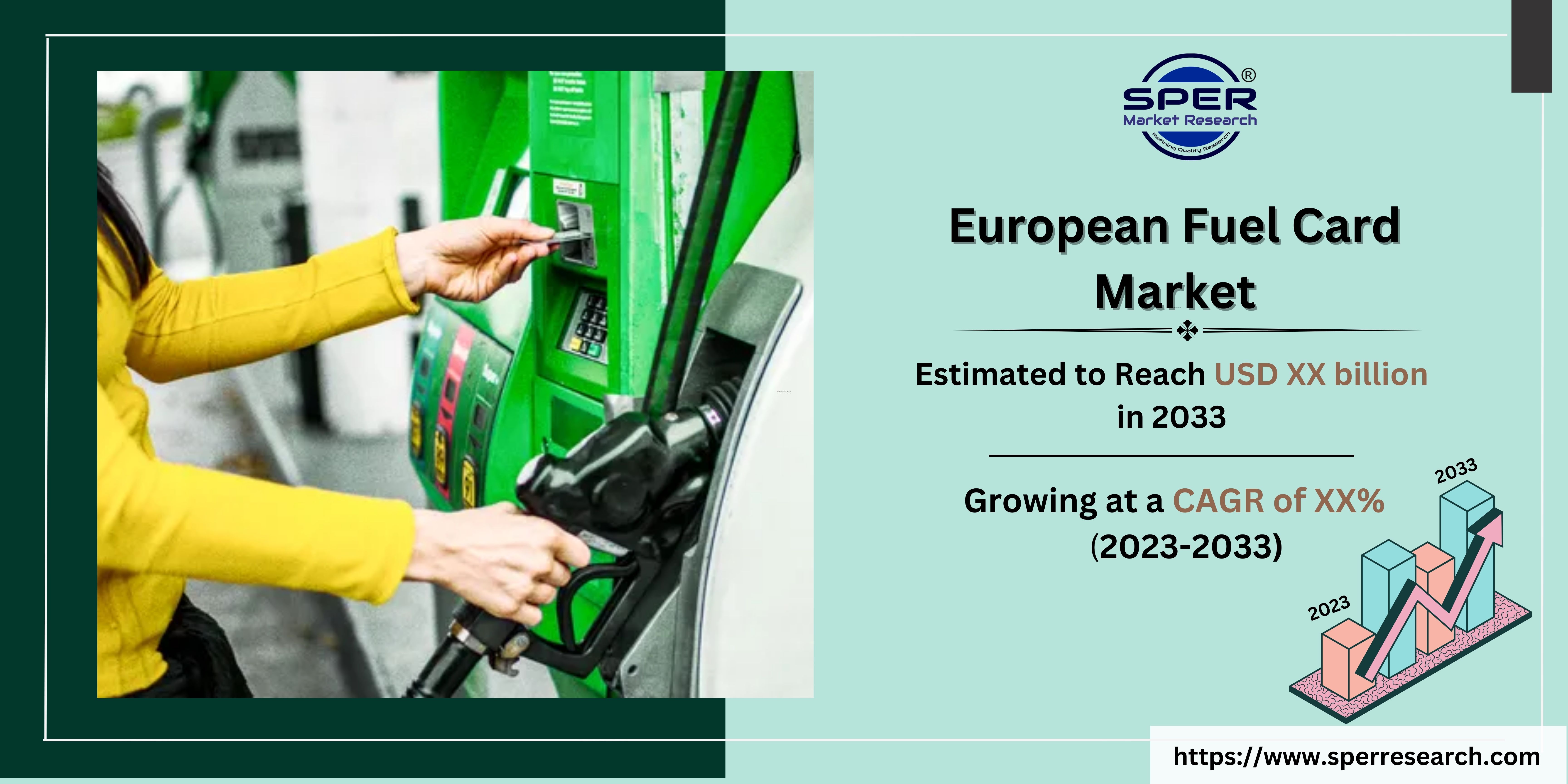
European Fuel Card Market Growth, Size, Trends, Competition, Challenges and Future Scope 2033
European Fuel Card Market Size- By Type, By Application- Regional Outlook, Competitive Strategies and Segment Forecast to 2033
| Published: Apr-2023 | Report ID: IACT2393 | Pages: 1 - 157 | Formats*: |
| Category : Information & Communications Technology | |||
- Digitalization and Integration: The European gasoline card market is becoming more digitalized and integrated. Fuel card companies were increasingly offering digital solutions to help businesses better control their fuel expenses. It is now typical to integrate with fleet management and expense tracking software.
- Changes in legislation, such as tax policies and emissions rules, may have an impact on the fuel card industry. To comply with these restrictions and provide value to clients, fuel card companies had to adjust their offers.


| Report Metric | Details |
| Market size available for years | 2019-2033 |
| Base year considered | 2022 |
| Forecast period | 2023-2033 |
| Segments covered | By Type, By Application. |
| Regions covered | United Kingdom, Germany, France, Italy, Others. |
| Companies Covered | BP International Limited., European diesel Card Limited., Exxil Mobil Corporation, Fleet Cor Technologies Inc., Shell International B.V. |
- Trucking Companies
- Delivery Services
- Taxis
- Rideshare Services
- Others
| By Type: |
|
| By Application: |
|
- European Fuel Card Market Size (FY’2023-FY’2033)
- Overview of European Fuel Card Market
- Segmentation of European Fuel Card Market By Type (Universal Cards, Branded Cards, Merchant Cards)
- Segmentation of European Fuel Card Market By Application (Parking, Fuel Refill, Vehicle Service, Toll Charge)
- Statistical Snap of European Fuel Card Market
- Expansion Analysis of European Fuel Card Market
- Problems and Obstacles in European Fuel Card Market
- Competitive Landscape in the European Fuel Card Market
- Impact of COVID-19 and Demonetization on European Fuel Card Market
- Details on Current Investment in European Fuel Card Market
- Competitive Analysis of European Fuel Card Market
- Prominent Players in the European Fuel Card Market
- SWOT Analysis of European Fuel Card Market
- European Fuel Card Market Future Outlook and Projections (FY’2023-FY’2033)
- Recommendations from Analyst
1.1. Scope of the report1.2. Market segment analysis
2.1. Research data source2.1.1. Secondary Data2.1.2. Primary Data2.1.3. SPER’s internal database2.1.4. Premium insight from KOL’s2.2. Market size estimation2.2.1. Top-down and Bottom-up approach2.3. Data triangulation
4.1. Driver, Restraint, Opportunity and Challenges analysis4.1.1. Drivers4.1.2. Restraints4.1.3. Opportunities4.1.4. Challenges4.2. COVID-19 Impacts of the European Fuel Card Market
5.1. SWOT Analysis5.1.1. Strengths5.1.2. Weaknesses5.1.3. Opportunities5.1.4. Threats5.2. PESTEL Analysis5.2.1. Political Landscape5.2.2. Economic Landscape5.2.3. Social Landscape5.2.4. Technological Landscape5.2.5. Environmental Landscape5.2.6. Legal Landscape5.3. PORTER’s Five Forces5.3.1. Bargaining power of suppliers5.3.2. Bargaining power of buyers5.3.3. Threat of Substitute5.3.4. Threat of new entrant5.3.5. Competitive rivalry5.4. Heat Map Analysis
6.1. European Fuel Card Market Manufacturing Base Distribution, Sales Area, Product Type6.2. Mergers & Acquisitions, Partnerships, Product Launch, and Collaboration in European Fuel Card Market
7.1. European Fuel Card Market Value Share and Forecast, By Type, 2023-20337.2. Universal Cards7.3. Branded Cards7.4. Merchant Cards
8.1. European Fuel Card Market Value Share and Forecast, By Application, 2023-20338.2. Parking8.3. Fuel Refill8.4. Vehicle Service8.5. Toll Charge8.6. Others
9.1. European Fuel Card Market Size and Market Share
10.1. European Fuel Card Market Size and Market Share by Type (2019-2026)10.2. European Fuel Card Market Size and Market Share by Type (2027-2033)
11.1. European Fuel Card Market Size and Market Share by Application (2019-2026)11.2. European Fuel Card Market Size and Market Share by Application (2027-2033)
12.1. European Fuel Card Market Size and Market Share by Region (2019-2026)12.2. European Fuel Card Market Size and Market Share by Region (2027-2033)12.3. United Kingdom12.4. Germany12.5. France12.6. Italy12.7. Others
13.1. BP International Limited.13.1.1. Company details13.1.2. Financial outlook13.1.3. Product summary13.1.4. Recent developments13.2. European Diesel Card Limited.13.2.1. Company details13.2.2. Financial outlook13.2.3. Product summary13.2.4. Recent developments13.3. Exxil Mobil Corporation13.3.1. Company details13.3.2. Financial outlook13.3.3. Product summary13.3.4. Recent developments13.4. Fleet Cor Technologies Inc.13.4.1. Company details13.4.2. Financial outlook13.4.3. Product summary13.4.4. Recent developments13.5. Shell International B.V13.5.1. Company details13.5.2. Financial outlook13.5.3. Product summary13.5.4. Recent developments
SPER Market Research’s methodology uses great emphasis on primary research to ensure that the market intelligence insights are up to date, reliable and accurate. Primary interviews are done with players involved in each phase of a supply chain to analyze the market forecasting. The secondary research method is used to help you fully understand how the future markets and the spending patterns look likes.
The report is based on in-depth qualitative and quantitative analysis of the Product Market. The quantitative analysis involves the application of various projection and sampling techniques. The qualitative analysis involves primary interviews, surveys, and vendor briefings. The data gathered as a result of these processes are validated through experts opinion. Our research methodology entails an ideal mixture of primary and secondary initiatives.



Frequently Asked Questions About This Report
PLACE AN ORDER
Year End Discount
Sample Report
Pre-Purchase Inquiry
NEED CUSTOMIZATION?
Request CustomizationCALL OR EMAIL US
100% Secure Payment






Related Reports
Our Global Clients
Our data-driven insights have influenced the strategy of 200+ reputed companies across the globe.




















